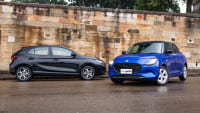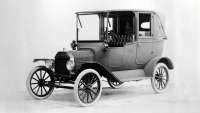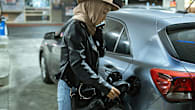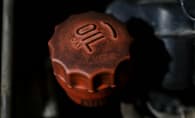Is it the magic solution to save driving as we know it? Or a fool’s errand that some of the biggest carmakers in the world are wasting billions on?
Hydrogen, either in the form of fuel cell vehicles or a liquid fuel, is seen as one of those two things by most people in the car industry. But while it causes a lot of division it seemingly has as many staunch advocates as it does detractors.
Crucially, one of the most ardent hydrogen supporters also happens to be the biggest car company in the world - Toyota. The Japanese giant has made it very clear that it does not believe there is one single solution for the future of cleaner, more efficient motoring, which is why it is working on hydrogen vehicles alongside it’s electric vehicles (EVs) and hybrids.
In this article we’ll look to explain to you what hydrogen powered cars Toyota is working on, how the technology works and what the future holds.
What is a Toyota hydrogen vehicle and how do they work?
As mentioned above, there are two different types of hydrogen-powered cars. The more common is the fuel cell vehicles (FCV), which uses compressed hydrogen gas to power a fuel cell that uses a chemical reaction to convert the hydrogen into electricity and then uses that electricity to power the vehicle. The benefits of this system is it only emits water, can be refueled in roughly the same time as a petrol or diesel vehicle and has the performance of an EV.
More recently, however, Toyota has begun investing heavily in hydrogen-fuelled internal combustion engines. This technology also uses compressed hydrogen, but it is injected into the combustion chamber of a modified petrol engine without emitting harmful CO2 emissions.
Toyota developed the technology in motorsport, entering a liquid hydrogen-powered GR Corolla into a domestic racing championship where it was able to improve power and efficiency. Those learnings were then applied to the liquid hydrogen-powered Corolla Cross concept revealed in 2022.
The biggest benefits of both these technologies is that refueling can take a matter of minutes and it emits no CO2.
However, there are significant barriers, namely a lack of infrastructure, with only nine functional hydrogen fuelling stations spread across Australia (with four more under construction at the time of publication).
Another challenge is that hydrogen is not seen as the solution by many carmakers, with BMW, Honda, Hyundai and Toyota its biggest advocates but the majority of the industry sees EVs as a better long-term solution.

How do we compare to different parts of the world?
Australia is still very much in its infancy compared to other markets around the world. With Toyota and Hyundai major supporters, it’s no surprise Japan and South Korea are two of the most advanced countries when it comes to hydrogen cars.
China has invested predominantly in fuel cell heavy vehicles (trucks and buses), as the technology translates well to those types of applications.
Europe is also more advanced, with a significant refuelling network, and a growing amount of FCV on the road. While California in the USA is another market that has pushed hydrogen as a zero-emissions alternative.
How many hydrogen refueling stations do we have?
To understand how much further there is to go before hydrogen-powered cars become a realistic option for Australian motorists you only need to look at the number of refuelling stations.
According to reports there are approximately 1160 refueling stations globally, with 198 of those in South Korea, 161 in Japan and 265 spread across Europe. The USA has 54 hydrogen stations but 53 of those are in California, so it does not have a nationwide network.
At the time of publication Australia had nine functional stations with four more under construction. Two of the functional refuelling rigs are located at Hyundai’s Sydney offices and Toyota’s Melbourne headquarters, respectively, so are not publicly accessible.
Toyota and Hyundai have partnered with Ampol and Pacific Energy to develop a national refuelling infrastructure, but this will likely take decades to become a meaningful and practical network for public use.
Toyota Australia Vice President Sales, Marketing and Franchise Operations Sean Hanley is not deterred, telling CarsGuide in 2023 that hydrogen acceptance will take time and resources but the Japanese brand is committed.
"Well, it's a big investment,” Hanley said. “But I'm sure if we went back 100 years when the horse and cart was running around, someone probably drove down in the first car and somebody would have said 'there's nowhere to fill that thing up.'"
Can I buy a hydrogen car in Australia from Toyota?
No, but you can lease one. Toyota Australia has offered its Mirai FCV in Australia since 2016, however, due to the lack of public infrastructure it is very particular in who can drive one.
Toyota does three-year lease deals with what it calls “forward thinking businesses and organisations” - generally energy companies and other partners that are supporting hydrogen uptake and zero-emission vehicles.

What does the future of Toyota hydrogen cars look like?
If Toyota, Hyundai and others continue to invest in public infrastructure, then perhaps in time either hydrogen FCV or hydrogen liquid-fuelled cars will become a viable alternative.
There’s a reason why companies like Ampol are part of the initiative to support hydrogen vehicles, as it is a closer like-for-like replacement for petrol and diesel.

Its existing infrastructure, its network of service stations, could be converted to dispense compressed hydrogen needed for the Toyota Mirai hydrogen FCV or something similar.
And Toyota is pushing ahead. The company has trials underway in Australia with a liquid-fuelled, hydrogen-powered HiAce in addition to its on-going Mirai lease arrangement.
The company is also investing in other high-profile projects to put the technology on the map. One of the most notable is Toyota’s plan to enter a hydrogen-powered prototype in the famous 24 Hours of Le Mans sports car race by the end of the decade.
Should you buy a Toyota hydrogen car?
Short answer - not yet. Putting aside the fact you can’t actually ‘buy’ one yet. The lack of any significant public infrastructure for refuelling would make it incredibly difficult to live with hydrogen cars in Australia at this moment in time.

Are hydrogen cars the future?
That’s difficult to say, especially as the rate of improvement in EV battery and recharging technology increases, extending range and reducing the time at the plug. Which could ultimately make hydrogen, in either form, a tougher sell to customers.





.jpg)
.jpg)

.jpg)


.jpg)

.jpg)


.jpg)



.jpg)























.jpg)




